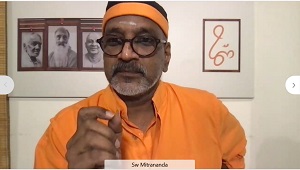On 31 January 2023, Vivekananda International Foundation (VIF) organised the tenth session of ‘Gītā for the Millennia’, an online talk series based on Śrīmad Bhagavad Gītā by Swāmī Mitrānanda of Chinmaya Mission. The Chapter 4 of the ‘Gītā, which elucidates on Jñāna Karma Sannyāsa Yoga was discussed during the session. Swāmiji began the talk by explaining the title of the chapter, which conveys that this chapter is essentially about answering the question, how can we detach ourselves from Karma. He clarifies that it is not to restrain ourselves physically from the action, but to detach ourselves mentally from the action.
The first verse that was discussed in the session was the verse 22 of the chapter, which goes, yadṛichchhā-lābha-santuṣhṭo dvandvātīto samaḥ siddhāvasiddhau cha kṛitvāpi na nibadhyate. The verse emphasis on the quality of staying contented, whatever may be the situations (results). It talks about the quality of maintaining equipoise in both success and failures. Swāmiji highlighted the concept of vimatsaraḥ (freedom from envy or jealousy).
The other verse that was discussed was verse 34 of the chapter, tad viddhi praṇipātena paripraśhnena sevayā upadekṣhyanti te jñānaṁ jñāninas tattva-darśhinaḥ. This verse highlights that one has to gain knowledge from a spiritual master by asking questions (with a true intention of knowing) by offering services to the master. At this point, Swāmiji quoted Sādhu T.L Vaswāni, who had once told, “The reward of service is more service.” This is because these are opportunities for a seeker to gain more inner purity. Offering services to the Guru will make a disciple gain Cittaśuddhi, which could be loosely translated as inner purity. It is this inner purity that prepares a disciple to acquire knowledge from the master, along with the right attitude of questioning. This way, Indian cultures encourage people to question and make knowledge experiential. This is contrary to other modes of teaching, where one ‘has’ to believe whatever the master says and the teaching is never experiential.
Another important verse that was discussed in the lecture was verse 36 of the chapter, which goes like, api ched asi pāpebhyaḥ sarvebhyaḥ pāpa-kṛit-tamaḥ sarvaṁ jñāna-plavenaiva vṛijinaṁ santariṣhyasi. It says that with the boat of knowledge, even the most pāpi can attain happiness and the state of actualisation with the path of knowledge and reach the divine. This is again contrary to the belief systems that divide people into eternal hell and eternal heaven, as such religious systems divide creation from the creator. Whereas, in Hinduism, creation or Sṛṣṭi is actually ‘self-creation’, which does not principally divide Brahman from its diverse manifestations. Swāmiji highlighted that India's G20 theme that highlights oneness through Vasudhaiva Kutumbakam, resonates with its fundamental understanding of creation, which does not divide the ‘creation’ from the creator.







Post new comment